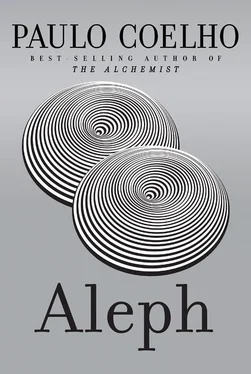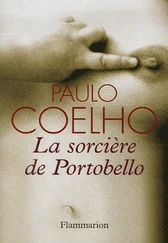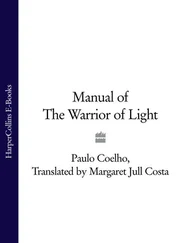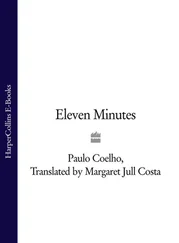I am gradually recovering from what I have just experienced. I know what she’s talking about, because centuries before I went through one of the doors I have just seen in her eyes. She was there, along with other people. Cautiously, I ask her what she saw.
“Everything. I don’t think I will ever be able to explain this, but the moment I closed my eyes, I was in a safe, comfortable place, as if I were in my own house.”
No, she doesn’t know what she’s saying. She doesn’t know yet. But I do. I pick up her bags and lead her back into the lounge.
“I haven’t got the energy to think or speak right now. Sit over there, read something, let me rest a little, and then I’ll be right back. If anyone says anything, tell them that I asked you to stay.”
She does as asked. I go to my compartment, collapse onto the bed fully clothed, and fall into a deep sleep.
SOMEONE KNOCKS AT THE DOOR.
“We’ll be arriving in ten minutes.”
I open my eyes. It’s night outside, or, rather, it’s the early hours of the morning. I’ve slept all day and will have difficulties now getting back to sleep.
“They’re going to uncouple the carriage and leave it in a siding, so take what you need for two nights in the city,” says the voice.
I open the shutters. Lights begin to appear; the train is slowing; we really are arriving. I wash my face and quickly pack whatever I will need for two nights in Ekaterinburg. What I experienced earlier is gradually beginning to come back to me.
When I leave the compartment, everyone is standing in the corridor, apart from Hilal, who is still sitting in the place where I left her. She doesn’t smile but simply shows me a piece of paper.
“Yao got me the permit.”
Yao looks at me and whispers, “Have you ever read the Tao Te Ching ?”
Yes, of course I have, like almost everyone of my generation.
“Then you’ll remember these words: ‘Expend your energies and you will remain young.’ ”
He nods slightly in the direction of the girl, who is still seated. I find this remark to be in bad taste.
“If you’re insinuating—”
“I’m not insinuating anything. If you have misunderstood me, it’s because that idea must be inside your head. What I meant, since you don’t understand Lao-tzu’s words, was: place all your feelings outside of yourself and you will be renewed. As I understand it, she is the right person to help you.”
Have the two of them been talking? Was Yao passing by when we entered the Aleph? Did he see what was happening?
“Do you believe in a spiritual world, in a parallel universe, where time and space are eternal and always present?” I ask.
The brakes begin to squeal. Yao nods, but I can see that he is weighing his words. At last, he says, “I don’t believe in God as you imagine Him to be, but I believe in many things that you could never even dream of. If you’re free tomorrow night, perhaps we could go for a walk together.”
The train stops. Hilal gets up and comes to join us. Yao smiles and embraces her. We all put on our coats, and, at 1:04 in the morning, we step out into Ekaterinburg.
THE OMNIPRESENT HILAL HAS DISAPPEARED.
I come down from my room, assuming that I’ll find her in the hotel lobby, but she isn’t there. Despite spending most of yesterday flat out on my bed, I had still managed to sleep well once back on terra firma. I phone Yao’s room, and we go out for a walk around the city. This is exactly what I need to do right now: to walk, walk, walk, breathe some fresh air, take a look at a city I’ve never visited before, and enjoy feeling that it’s mine.
Yao tells me a few historical facts—Ekaterinburg is Russia’s third-largest city, rich in minerals, the kind of fact that one can find in any tourist leaflet—but I’m not in the least interested. Then we stop outside what looks like a huge Orthodox church.
“This is the Cathedral-on-the-Blood, built on the site of a house owned by a man called Nikolai Ipatiev. Let’s go inside.”
I’m starting to feel cold, and so I do as he suggests. We go into what appears to be a small museum, in which all the notices are in Russian.
Yao looks at me as if I should know what’s going on, but I don’t.
“Don’t you feel anything?”
“No,” I say. He seems disappointed.
“You mean that you, a man who believes in parallel worlds and in the eternity of the present moment, feel absolutely nothing?”
I feel tempted to tell him that what brought me to Russia in the first place was a conversation with J. about precisely that, my inability to connect with my spiritual side. Except that this is no longer true. Since I left London, I’ve been a different person, feeling calm and happy on my journey back to my kingdom and my soul. For a fraction of a second, I remember the episode on the train and Hilal’s eyes, but I quickly drive the memory from my mind.
“The fact that I can’t feel anything doesn’t necessarily mean that I’m disconnected. Perhaps my energies at this moment are alert to other discoveries. We’re in what seems to be a recently built cathedral. What exactly happened here?”
“The Russian Empire ended in the house of Nikolai Ipatiev. On the night of July 16, 1918, the family of Nicholas II, the last tsar of all the Russias, was executed along with his doctor and three servants. They started with the tsar himself, who received several bullets in the head and chest. The last to die were Anastasia, Tatiana, Olga, and Maria, who were bayoneted to death. It’s said that their ghosts continue to haunt this place, looking for the jewels they left behind. People also say that Boris Yeltsin, when he was president of Russia, decided to demolish the old house and build a church in its place so that the ghosts would leave and Russia could begin to grow again.”
“Why did you bring me here?”
For the first time since we met in Moscow, Yao seems to be embarrassed.
“Because yesterday you asked me if I believed in God. Well, I did believe until He took away my wife, the person I loved most in the world. I always thought I would die before her, but that isn’t what happened,” Yao tells me. “The day we met I felt certain that I’d known her since before I was born. It was raining heavily, and she declined my invitation to tea, but I knew then that we were like the clouds that fill the sky so that you can no longer tell where one ends and another begins. We married a year later, as if it were the most obvious and natural thing in the world to do. We had children, we honored God and family, then, one day, a wind came and parted the clouds.”
I wait for him to finish what he has to say.
“It’s not fair. It wasn’t fair. It may seem absurd, but I would have preferred it if we had all departed together for the next life, like the tsar and his family.”
No, he has still not said everything he wants to. He’s waiting for me to say something, but I remain silent. It seems that the ghosts of the dead really are there with us.
“And when I saw you and the young woman looking at each other on the train in the vestibule between the carriages, I remembered my wife and the first glance we ever exchanged, and how even before we spoke, something was telling me, ‘We’re together again.’ That’s why I wanted to bring you here, to ask if you can see what we cannot see, if you know where she is now.”
So he had witnessed the moment when Hilal and I entered the Aleph.
I look around the room again, thank him for having brought me there, and ask if we can continue our walk.
“Don’t make that young woman suffer,” he says. “Whenever I see her looking at you, it seems to me that you must have known each other for a long time.”
Читать дальше
